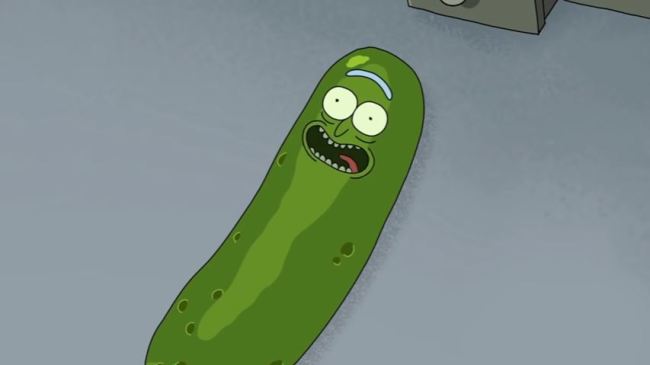Rick and Morty Recap: Pickle Rick


The Recap: Rick turns himself into a pickle to get out of family therapy and winds up stuck. While Beth, Summer, and Morty talk through their problems, Rick finds himself accidentally swept up in a gruesome action movie.
R&M is at its best when it balances its fantastical and mundane plots, usually tying them together around a central theme. While the content of sitting in a therapist’s office couldn’t be more removed from a slurry of Die Hard, Metal Gear Solid, Liam Neeson, and countless other action flicks and tropes, both plots focus around issues of agency and choice. Both begin with the characters being “swept up,” literally or figuratively, in some grand occurrence that seems to leave them powerless, and work their way up from there.
The execution mostly focuses on Rick and Beth, leaving Morty and Summer to act as this episode’s baseline. By the end, it’s clear that while no one has their shit together, the kids are at least trying to process what they’ve been through and improve things. The adults, meanwhile, would rather run screaming from any kind of revelation in favor of trading faux-philosophical dialogue or just ignoring the issue entirely.
The last point might be the most interesting one. The first two seasons don’t shy away from the fact that Rick is terrible, but they also encourage us to think he’s sort of cool. He gets all the great one-liners, he takes the audience to new and exciting places, he leads badass action scenes. And those elements cast an admiring light on his self-destructive habits and bleak nihilism (the show has never shied from nihilism, but it increasingly makes its stance as a constructive version that knows it’s different from that hopelessness).
If “Rickmancing the Stone” distanced us from Rick, this one brings us right up close for a dose of visceral unpleasantness. In some ways Rick’s assault on the mansion isn’t functionally different from his takedown of the Citadel of Ricks in the premiere; it’s the details that make it matter. While the premiere was a grand sci-fi battle that tugged us along on the assumption that Rick was doing something ultimately noble, here he’s wading through a sewer and killing rats and roaches, working bits of brain with his tongue.
The rat-bug suit is some amazing Cronenbergian body horror, and the sheer nastiness that underpinned Rick’s first few kills is embodied in the pragmatic trophies he wears for the rest of the episode. At first, he kills to save himself, then to get mobile, then just because some dudes irritated him; and even once cool lasers and explosions are involved, there’s still that sickly veneer in the background. The imagery tells us that to Rick, everything in the world is spare parts that can be broken down if he decides he has a use for it.
The episode climax brings the reminder of that decay in an excellent way. It might arguably be a narrative cheat to have a character who can handily monologue all of Rick’s problems in a succinct form, but putting it in the form of choice helps ease that burden. In the end, it’s not really a thesis on Rick’s character or an attempt to offer an “explanation” that can then be reverse engineered into a cure; it’s a window into how his character might choose to reform his behavior going forward. It keeps the uncertainty going without being cheap, and Rick gives just enough of a consolation gesture to keep the viewer from simply writing him off.
If last week I was concerned the writers might be planning to sideline Beth, this episode has left me convinced that her increasingly unstable emotional state will be a major fixture of the season. Her desire to keep Rick in her life at any cost is no longer a personal decision but one that affects her family, and with people depending on her it’s not something she can continue being entirely selfish about. Or rather, she can—but that would make her just like Rick in ways that neither of them probably want deep down (waaaaaaaay deep; deeper; somewhere in there).
The kids have it worst of all in the meantime, and I’m hoping the writing will continue to ratchet up that tension and division of loyalty versus self-preservation even when it takes time out for one-off adventures. Something is going to give, and it’s probably going to be real ugly when it does.
Vrai is a queer author and pop culture blogger; they’re very concerned about these kids. You can read more essays and find out about their fiction at Fashionable Tinfoil Accessories, listen to them podcasting on Soundcloud, support their work via Patreon or PayPal, or remind them of the existence of Tweets.
Want more stories like this? Become a subscriber and support the site!
—The Mary Sue has a strict comment policy that forbids, but is not limited to, personal insults toward anyone, hate speech, and trolling.—
Have a tip we should know? [email protected]